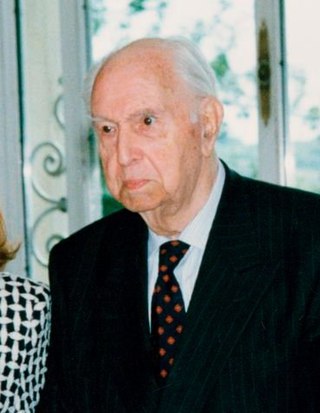Related Research Articles

Rafael Lapesa Melgar was a Spanish philologist, a historian of language and of Spanish literature.

Pedro Laín Entralgo was a Spanish physician, historian, author and philosopher. He worked, fundamentally, on medical history and anthropology.
Thomas F. Glick is an American academic who taught in the departments of history and gastronomy at Boston University from 1972 to 2012. He served as the history department's chairperson from 1984 to 1989, and again from 1994 to 1995. He has also been the director of the Institute for Medieval History at Boston University since 1998. Dr. Glick's course offerings for the history department covered the topics of medieval Spain, medieval science and medieval technology, and the history of modern science. For the gastronomy department he taught a number of classes, including "Readings in Food History" and "Readings in Wine History," and has designed a class on using cookbooks as primary resources. He is currently the director of the Shtetl Economic History Project and is a corresponding member of Reial Acadèmia de Bones Lletres de Barcelona, an honorary member of Sociedad Mexicana de Historia de la Ciencia, and holds membership in the History of Science Society, the Society for the History of Technology, Sociedad Española de Historia de la Ciencia, Societat Catalana d'Història de la Ciència, and the Society for the Preservation of Old Mills. He has also authored numerous works pertaining to Spain, medieval history, Darwinism and other subjects.

Gregorio Salvador Caja was a Spanish linguist specialized in structural semantics. Salvador was born in Cúllar, Granada, and studied at the University of Granada and Complutense University. He was one of the most important disciples of Manuel Alvar. He wrote for the Spanish newspaper ABC.

Don Enrique Jaime Ruspoli y Morenés, Caro y Arteaga, dei Principi Ruspoli is a Spanish aristocrat, third son of Camilo Ruspoli, 4th Duke of Alcudia and Sueca, and wife Dona María de Belén Morenés y Arteaga, García-Alesson y Echaguë, 18th Countess of Bañares.
Alfredo Alvar Ezquerra is a Spanish historian, research professor at the Spanish National Research Council (CSIC) and modern history specialist. He is a correspondent academician at the Royal Academy of History and associated professor at the Complutense University of Madrid.

Martín Almagro Gorbea is a Spanish prehistorian.
The Libros del saber de astronomía, literally "book[s] of the wisdom of astronomy [astrology]", is a series of books of the medieval period, composed during the reign of Alfonso X of Castile. They describe the celestial bodies and the astronomical instruments existing at the time. The collection is a group of treatises on astronomical instruments, like the celestial sphere, the spherical and plane astrolabe, saphea, and universal plate for all latitudes, for uranography or star cartography that can be used for casting horoscopes. The purpose of the rest of the instruments, the quadrant of the type called vetus, sundial, clepsydras, is to determine the time, which was also needed to cast the horoscope. The king looked for separate works for the construction and use of each device.
This is a list of encyclopedias and encyclopedic/biographical dictionaries published on the subject of history and historians in any language. Entries are in the English language except where noted.

Ramon Sainero is the director of the Institute of Celtic Studies (IEC) of Spain and Associate Professor and Professor at UNED during the last 37 years.
José María Jover Zamora was a Spanish historian.
Ana Margarida Costa Arruda dos Santos Gonçalves is a Portuguese historian and archaeologist specialized in Phoenician-Punic archaeology.

Eduardo Saavedra y Moragas, Spanish engineer, architect, archaeologist and Arabist, member of the Real Academia de la Historia, Spanish Royal Academy of Sciences, Real Academia Española and cofounder-president of the Real Sociedad Geográfica.
Manuel Alvar was a Spanish linguist, historian, and university professor who specialized in the study of dialectology and philology of the Spanish language. Throughout his career, Alvar oversaw and influenced the creation of many Spanish linguistic atlases; maps which recorded speech variations in a given geographical area. He served as Director of the Real Academia Española for four years and was a member of language academies throughout Europe and Latin America.
Antonio Tovar Llorente was a Spanish philologist, linguist and historian.

José Solís Ruiz was a Spanish politician, known for his role in Francoist Spain, during which he occupied a number of important posts.
José Luis Rodríguez Jiménez is a Spanish historian, considered an expert in the history of the right-wing extremism in Spain.
Julio Aróstegui Sánchez (1939–2013) was a Spanish historian. Professor at the Complutense University of Madrid (UCM), some of his research lines included the study of political violence in Modern Spanish history, Carlism, the Spanish Transition, the Spanish Civil War, the history of the workers' movement and collective memory. His scholar production also intertwined with the theoretical problems of history and the methodology of research.
Ezequiel González Mas was a Spanish historian of Spanish literature, a cervantista, poet, art critic and writer.
References
- ↑ ""Julio Caro Baroja" University Institute of Historiography" . Retrieved 7 January 2015.